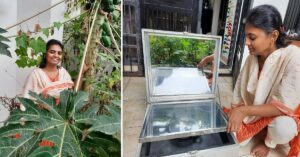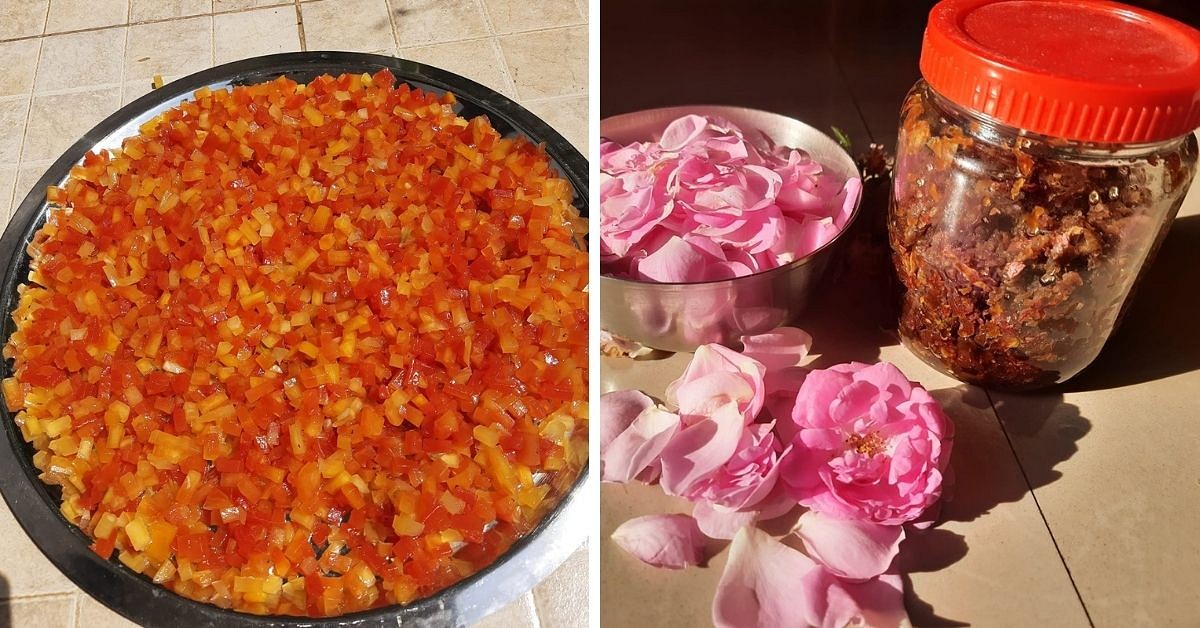For Pune-based Pallavi Patil, the past seven years have been all about embracing an eco-friendly lifestyle. She has been successful in dramatically reducing her family’s reliance on chemical products, a way of life that isn’t typically associated with metropolitan areas.
Pallavi, who hails from Shirasgaon in Sangli district of Maharashtra, graduated with a degree in Computer Engineering in 2003 and worked with software companies for six years. Since quitting the corporate world citing personal reasons, her focus has been on bringing up her two daughters, now aged 10 and 15, respectively, and introducing them to her roots — a toxin-free, agro-based lifestyle.
She tells The Better India, “People around us often express their surprise at how we live, but my husband and I belong to farmer families and are familiar with choices that don’t harm the environment. It hasn’t been a difficult transition for us, and it doesn’t have to be for anyone else either. For instance, one can easily live without a refrigerator, substitute chemical cleaners with natural ones and purchase only organic produce. It’s about the willingness to change our little habits that would make the most difference.”
Solar Cooking, Sans Refrigeration

Pallavi grows a variety of vegetables, fruits, and medicinal plants in her home garden. It boasts of fruit trees such as banana, papaya and pomegranate, seasonal vegetables like brinjal, bottle gourd and tomato, and spices such as ginger and turmeric. “I focus on growing local varieties of vegetables. It is rare for us to buy any packaged food, and if we need to buy any other produce, we directly approach organic farmers and buy limited quantities,” she says.
One of the first adjustments that Pallavi made to achieve a green lifestyle was letting go of a refrigerator. “Not only does this help the environment, but it has also improved the overall quality of our health. The most common concern is not being able to utilise perishable items to the full potential of their shell-life but organic fruits and vegetables last up to two weeks without a fridge. Milk, too, may be boiled twice a day, each time before it is ingested, and lasts us for a couple of days. I prepare meals on a needs-based requirement, so we hardly have any leftovers that need to be stored,” she explains.
Pallavi doesn’t own an AC or a cooler. She says that the family has never felt the need for one either as the natural air flow in her house is sufficient owing to good ventilation. She also uses a box-type solar cooker, comprising an insulated square box, a glass lid on the cooking tray and a mirror on its underside. The food placed in metal pots is cooked by the heat absorbed by a blackened surface.
“Our gas cylinder used to last us for two months, but using a solar cooker helps me save 15 days’ worth of gas and half the labour. The food is cooked at stable temperatures and doesn’t require dedicated stirring. The only drawback to be considered is planning for meals beforehand. For instance, if I want to prepare puranpoli, I would have to cook the dal today and complete the dish tomorrow morning. Each meal takes around three-four hours to be completed, but solar cooking doesn’t require constant supervision and I can attend to other errands in the meantime,” she says.
Pallavi adds that while the solar cooker can’t be used to make chapatis or frying anything, spice mixes such as sambar masala and garam masala, and dishes like dhokla, nankhatai, pizza, and even a cake can be easily prepared.
Using ingredients from her home garden, she has a knack for making accompaniments such as tomato sauce, gulkand, papaya tutti-frutti, and various chutneys and pickles that do not contain any harmful chemical preservatives.

Homemade, Agro-Based Cleaners
Most commercial cleaning products contain harmful ingredients such as ammonia and bleach, and may release chemicals like volatile organic compounds (VOCs). “Even products marketed as ‘being green’ may not be biodegradable and pose a variety of health risks,” says Pallavi, who uses natural ingredients to make soap, shampoo, dishwashing liquid, detergent and floor cleaners for her home.
“Sometimes, I dry papaya and pomegranate peels and crush them to make a powder for the soap base. Pomegranate peel powder can also be used for dental cleaning and washing hair, and coconut peel works as an efficient scrubber for washing utensils. I buy about 5 kg each of shikakai powder and reetha (Indian soapberry) powder to wash my vessels and the terrace, which is enough to last me a year. These are easily available at wholesale medical stores and make for a much cheaper alternative to chemical cleaners,” she explains.
She adds that she rarely disposes of fruit and vegetable peels from her kitchen and uses composting to make bio-enzymes, which make for both an effective cleaner and a liquid fertilizer.
But she is reluctant to start a commercial business of her own eco-friendly products. “A full-fledged business would mean manufacturing products in large quantities, which would involve the usage of packaging material and the consumption of more energy. It might be difficult to come up with a cost-effective model and the essence of sustainability would be lost,” she says. “However, my younger daughter has come up with a formula for homemade dantmanjan (tooth powder) and we sell it locally, encouraging people to bring their own steel containers. If non-residents of Pune request an order, I have no choice but to send it by post, but I like to avoid it to the extent I can.”
On her YouTube channel, Pallavi’s begun a weekly series titled ‘Cooking Under the Sun’ featuring how-to videos on preparing snacks using a solar cooker. She also makes tutorials for homemade cleaners and her take on a DIY Ayurvedic soap has amassed over 21,000 views.
“I have received a lot of positive feedback from strangers who have started using bio-enzymes as cleaners. The other day, two women told me that they have started making money by selling homemade soaps made from my recipe, and some others were able to address their long-term dental problems by using our natural dantmanjan. I hope that as our content reaches more people, they stop using chemical products altogether, or at least at their homes,” she says.
Read this story in Hindi here.
(Edited by Yoshita Rao)
No comments:
Post a Comment